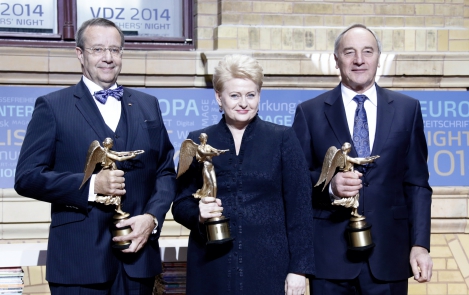
By Peter Tase
On November 6, the President of Lithuania Dalia Grybauskaitė traveled to Germany, together with her two counterparts from Latvia and Estonia, to accept the Golden Victoria award (Goldene Victoria für die Europäer des Jahres) on behalf of her government at a solemn ceremony in Berlin. This year’s award was given to the three Baltic States for the promotion of European ideas, struggle for peace and freedom, achievements in implementing European reforms as well as the successful management of the economic crisis and trust in the future of Europe.
According to President Grybauskaite, this award recognizes the efforts of every Lithuanian citizen in building a stable government. Lithuania, Estonia and Latvia are model nations of trust throughout Europe.
As it was announced by the official website of the President of Lithuania: the “’Golden Victoria’ awards are presented annually by the representatives of the influential German analytical media in four categories: promotion of pro-European ideas, promotion of European integration, business achievements and lifetime merits.”
In this ceremony participated over 300 guests and the three presidents of the three Baltic countries received the Golden Victoria statuette and the laudation speech was delivered by the President of the German Bundestag, Norbert Lammert.
In her speech, President Grybauskaite reiterated: “The people of the Baltic countries have always strongly believed in Europe, they never had any doubts about the chosen path though perfectly understanding that it will not be easy. We all knew that freedom is not a given, so we took responsibility for our nations and walked resolutely along the European road. Today, as Europe faces new challenges, it is especially important not to forget the values which encouraged Lithuanians, Latvians and Estonians to come together forming the Baltic Way. The same values tore down the Berlin Wall a quarter of a century ago. Only together, looking for what unites us rather than divides, can we maintain peace in our continent.”
In his statement, President Toomas Hendrik Ilves stated: “In unison with the other two Baltic states, Poland and several other countries, we proved that history and geography does not represent a fate, and despite the brutal totalitarian regime that prevailed for a half a century, it is still possible to develop into a democratic country that relies on the principles of a state based on the rule of law and respect for human rights,” President Ilves described Estonia as a “liberal, democratic country that is characterized by free and fair elections, an independent system of justice, freedom of journalism, a country with the highest level of freedom of Internet in Europe, free markets and with a free economy. Today, Estonia has become a Northern European country that is integrated in the best possible way through its membership at the European Union, NATO, the Schengen area and the euro area. We are also probably the most IT-minded country in Europe. This is not something that just happened or a result of a ‘Western expansion’ – an expression that we hear quite often these days. This is an expression of the will of an independent, sovereign nation.”
The President of Germany, Joachim Gauck, who gave an official dinner after the ceremony to honor his colleagues, described his fellow three presidents as ambassadors of the idea of Europe. “As we look at the world now, 25 years after the fall of the Berlin Wall, we can say that we chose the right path at the right time; however, we have also been fortunate.”
In Berlin, the Lithuanian President Dalia Grybauskaitė together with her Latvian and Estonian heads of state, held a meeting with German President Joachim Gauck. The topics discussed were the security situation in the region, information technology and energy security matters. Additionally the European Union Economic Growth and strengthening of business relations were at the center of discussions.
The timing of this event was marked by the commemoration of the 25th anniversary of the fall of the Berlin Wall in Germany. This divisive structure and a symbol of the Iron Curtain and totalitarian regime of the Soviet Union, was torn down on 9 November 1989.
In this occasion the Golden Victoria awards were also presented to Mr. Ralph Dommermuth, a European businessman, on the business accomplishments category and to the German former President Roman Herzog, for his contributions towards the EU integration and to the German football player Miroslav Klose.
Previous recipients of the award in the category of ‘promotion of pro-European ideas’ were include former European Commission President José Manuel Barroso, Ireland’s Prime Minister Enda Kenny and European Council President Donald Tusk.
References and Sources:




